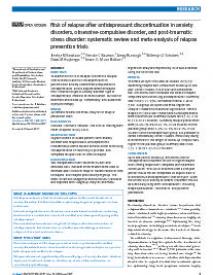Risk of relapse after antidepressant discontinuation in anxiety disorders, obsessive-compulsive disorder, and post-traumatic stress disorder : systematic review and meta-analysis of relapse prevention trials
Objectives To examine the risk of relapse and time to relapse after discontinuation of antidepressants in patients with anxiety disorder who responded to antidepressants, and to explore whether relapse risk is related to type of anxiety disorder, type of antidepressant, mode of discontinuation, duration of treatment and follow-up, comorbidity, and allowance of psychotherapy.
Design Systematic review and meta-analyses of relapse prevention trials.
Data sources PubMed, Cochrane, Embase, and clinical trial registers (from inception to July 2016).
Study selection Eligible studies included patients with anxiety disorder who responded to antidepressants, randomised patients double blind to either continuing antidepressants or switching to placebo, and compared relapse rates or time to relapse.
Data extraction Two independent raters selected studies and extracted data. Random effect models were used to estimate odds ratios for relapse, hazard ratios for time to relapse, and relapse prevalence per group. The effect of various categorical and continuous variables was explored with subgroup analyses and meta-regression analyses respectively. Bias was assessed using the Cochrane tool.
Results The meta-analysis included 28 studies (n=5233) examining relapse with a maximum follow-up of one year. Across studies, risk of bias was considered low. Discontinuation increased the odds of relapse compared with continuing antidepressants (summary odds ratio 3.11, 95% confidence interval 2.48 to 3.89). Subgroup analyses and meta-regression analyses showed no statistical significance. Time to relapse (n=3002) was shorter when antidepressants were discontinued (summary hazard ratio 3.63, 2.58 to 5.10; n=11 studies). Summary relapse prevalences were 36.4% (30.8% to 42.1%; n=28 studies) for the placebo group and 16.4% (12.6% to 20.1%; n=28 studies) for the antidepressant group, but prevalence varied considerably across studies, most likely owing to differences in the length of follow-up. Dropout was higher in the placebo group (summary odds ratio 1.31, 1.06 to 1.63; n=27 studies).
Conclusions Up to one year of follow-up, discontinuation of antidepressant treatment results in higher relapse rates among responders compared with treatment continuation. The lack of evidence after a one year period should not be interpreted as explicit advice to discontinue antidepressants after one year. Given the chronicity of anxiety disorders, treatment should be directed by long term considerations, including relapse prevalence, side effects, and patients’ preferences.
In: BMJ, ISSN 0959-8138, eISSN 1756-1833 | 358 | September | j3927
https://doi.org/10.1136/bmj.j3927
This article has a correction. Please see: https://doi.org/10.1136/bmj.j4461


